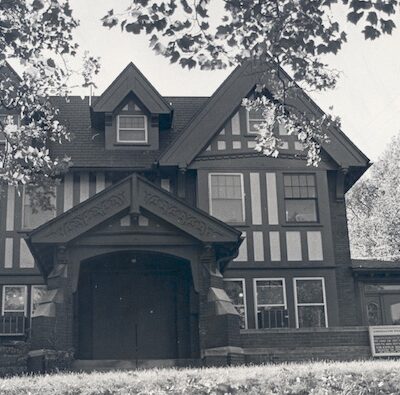
Young Peoples Synagogue is a Jewish congregation in the Squirrel Hill neighborhood of Pittsburgh. It was founded in late 1945 and early 1946 by a group of young Jewish people affiliated with the Hapoel Hamizrachi Zionist Youth Organization and working in association with the Hebrew Institute of Pittsburgh. The congregation was modeled on the emerging Young Israel movement, providing a modern American take on traditional Orthodox ritual. From the beginning, Young Peoples Synagogue prioritized lay participation as a way to train younger people in basic congregation affairs such as leading services, giving sermons, and running organizational meetings. Early members were encouraged to retain their membership in larger congregations throughout the area.
Starting in the early 1950s, a second wave of members joined the congregation. These new members included several families that had recently transferred to Pittsburgh to work at the University of Pittsburgh, Carnegie Mellon University, and Westinghouse Electric Corporation.[1]Eleanor Hershberg Young Peoples Synagogue 66th Anniversary talk 2012 [MFF 4946] (online). Young Peoples Synagogue legally incorporated in 1955. The purpose of the congregation, as described in its first constitution, was “to promote traditional Judaism in all facets of living; to encourage young men and young women to participate actively in all phases of the Synagogue service; to stimulate participation in other forms of Jewish communal life; to strengthen the bonds with our brethren in Israel and with the Jewish people everywhere; and to exemplify Judaism by emphasizing the principles of righteousness and brotherhood ins society at large.”[2]Young Peoples Synagogue constitution, c1955 (online). In later years, the congregation also adopted the Hebrew name K’hillah K’dosha Bonai Israel. By the late 1960s, Young Peoples Synagogue was regularly attracting more than 100 people for weekly Shabbat services and as many as 400 people for annually High Holiday services.[3]Schwartz, Robert. “Laymen Have Selves To Blame If Sermons Drag Out Too Long,” Pittsburgh Press, Sept. 13, 1969 (online—Newspapers.com).
Young Peoples Synagogue described its service as “traditionally Orthodox,” but its membership drew from various denominations of Judaism. The congregation enforced split seating without a mechetiza (wall) between the men’s and women’s sections.
Young Peoples Synagogue met at the Hebrew Institute in Squirrel Hill from its founding until 1996, when the building was sold to Yeshiva Schools of Pittsburgh. That year, Young People’s Synagogue relocated into the B’nai Zion Congregation synagogue across Forbes Avenue. Following a fire at the building in 2000, Young People’s Synagogue temporarily met at the Labor Zionist Educational Building, across Denniston Street. In the 1970s, Young Peoples Synagogue seriously considered but ultimately rejected offers to merge with Chofetz Chaim Congregation and Shaare Torah Congregation.[4]“YPS-Chofetz Chaim,” March 22, 1972 (online). [5]YPS-Shaare Torah merger document, undated (online).
Young Peoples Synagogue never employed a rabbi. Cantor Henry Perlmutter led weekly services until 1976. In later years, Cantor Moshe Taube led High Holiday services.
References
| ↑1 | Eleanor Hershberg Young Peoples Synagogue 66th Anniversary talk 2012 [MFF 4946] (online). |
|---|---|
| ↑2 | Young Peoples Synagogue constitution, c1955 (online). |
| ↑3 | Schwartz, Robert. “Laymen Have Selves To Blame If Sermons Drag Out Too Long,” Pittsburgh Press, Sept. 13, 1969 (online—Newspapers.com). |
| ↑4 | “YPS-Chofetz Chaim,” March 22, 1972 (online). |
| ↑5 | YPS-Shaare Torah merger document, undated (online). |